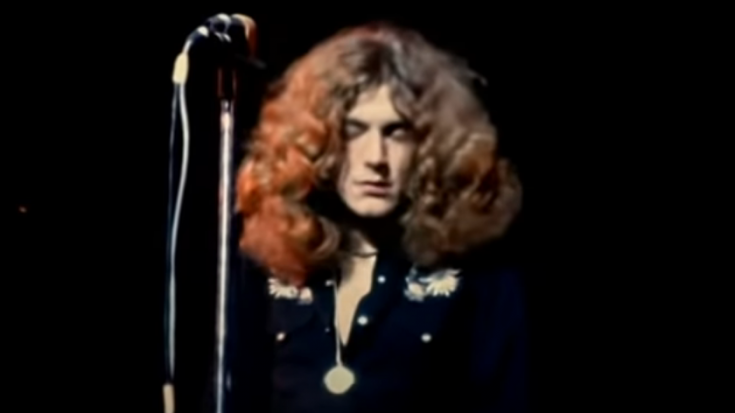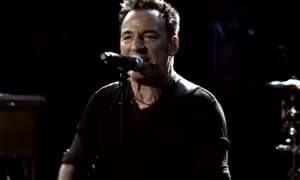Why Led Zeppelin Fans Banned The Band In Chicago

via Led Zeppelin / Youtube
February 1975. Led Zeppelin, titans of rock with a siren song of thunderous riffs and electrifying vocals, stood poised to unleash their latest sonic beast – Physical Graffiti. America hungered for the next chapter in their epic saga, and a Winter Tour was meticulously planned, ready to melt the frost with the scorching heat of Zep’s raw power.
Led Zeppelin, by this point, were more than just a band. They were a sonic revolution, a four-headed hydra breathing fire across stadiums, their name synonymous with excess and audacity. Their concerts were epic affairs, marathons of musical might often spilling over into the wee hours, fueled by a potent cocktail of youthful fervor and unbridled energy.
The band members themselves, long-haired gods with mischievous grins, embodied the rebellious spirit of a generation, living life on the edge and pushing the boundaries of rock ‘n’ roll with every blistering performance.
Yet, while Zeppelin courted controversy and reveled in the chaos they often inadvertently incited, it was not their legendary antics that led to their unexpected ban from the Windy City. In a twist of ironic fate, it was the unwavering devotion of their rabid fans that would raise the red flag, transforming Chicago from a promised land of roaring guitars and headbanging crowds into a forbidden zone for the mighty Zeppelin.
https://twitter.com/BoredWeb3/status/1264594004001210369
The anticipation boiling into a mess that would soon burn the band
The irony hangs thick in the air, heavy with the riffs of “Whole Lotta Love” and the echo of thunderous applause. Boston, a city with a rock ‘n’ roll heart pumping beneath its cobblestones, had banned Led Zeppelin, its own adopted heroes.
No, this wasn’t the decree of some puritanical killjoy, but the consequence of a love so fervent, so fanatical, it burned with the intensity of a dragon’s breath. Let’s rewind to 1975, a time when rock gods walked the earth and ticket sales resembled gladiatorial tests of endurance.
Imagine, if you will, a world before online presales and lightning-fast digital queues. Tickets were tangible tokens of rock ‘n’ roll salvation, and on January 5th, anticipation crackled like static in the Boston air. News spread like wildfire: 9,000 tickets, coveted prizes in a battle royale for Zeppelin disciples, would go on sale the next morning.
Anticipation morphed into frenzy, lines snaking around the Garden, anticipation palpable enough to cut with a guitar string. But in this rock ‘n’ roll opera, where love and chaos often share the same stage, the curtain was about to rise on a tragedy of unintended consequences.
“The kids broke into the beer concessions”
January 5th, 1975, Boston. Around 3,000 Led Zeppelin devotees huddled in the biting cold, a shivering queue snaking around the iconic Boston Garden. Tickets for the February 4th show were their holy grail, and winter’s icy grip couldn’t dampen their burning anticipation.
Seeking refuge from the harsh temperatures, the box office staff, in a moment of ill-fated kindness, allowed the fans to camp out inside. Little did they know, they were inviting chaos to warm its frozen fingers by the venue’s flickering neon lights.
As the clock ticked past midnight, a security shift change proved to be the catalyst for pandemonium. According to author Steven Davis, fueled by adrenaline and perhaps something stronger, “the kids broke into the beer concessions and started feeding themselves.”
What began as a sugar rush of rebellion escalated into a full-blown firestorm. Fire hoses roared, spraying not just the exuberant mob but also the very arena they worshipped, transforming the ice rink into a watery battlefield. Driven by a surreal mix of teenage exuberance and frosty frustration, some even resorted to torching the seats, marking the hallowed hardwood with the scars of their misguided devotion.
Despite the damaging mess, no arrests were made
The mayhem continued with a vengeance. Concessions were ransacked, beer looted, and a piano dragged onto the ice like a macabre trophy. Fire extinguisher showers added a chemical mist to the already chaotic scene. Finally, riot police with canine reinforcements arrived, barking a harsh reality check into the revelry.
By 5:30 am, a semblance of order was restored, yet the aftermath was a spectacle of destruction. Eleven concession stands, two souvenir kiosks, and 300 cases of beer lay vanquished, casualties of a night that started with a simple desire for rock ‘n’ roll salvation.
And amidst the wreckage, a peculiar detail stands out: despite the confiscated knives, the violence of the night yielded no arrests, no injuries. Perhaps even the authorities recognized the absurdity of the situation, the bizarre ballet of fire hoses and frosty fanaticism that played out within the Boston Garden’s hallowed walls.
But the true cost was far steeper than broken seats and pilfered beer. It was the trust shattered, the promise of Zeppelin’s return broken by the misguided actions of their own loyal fans.
The Boston mayor slammed the band with a five-year ban
The frigid Boston dawn of January 6th painted a grim picture. The once majestic Boston Garden lay in tatters, the aftermath of a night fueled by youthful exuberance and Led Zeppelin’s siren song. Estimates of the damage danced between $10,000 and $50,000, a far cry from the rock ‘n’ roll dream ticket it had promised just hours earlier.
Author Steven Davis, a witness to the carnage, described the scene as a “smoking ruin, completely flooded… like the place had been bombed.” The echoes of shattered seats and pilfered beer cans hung heavy in the air, a testament to the misguided passion that had taken hold.
Despite the chaos, the ironclad machinery of fandom pressed forward. At 2 am, as dawn tentatively stretched its fingers across the horizon, the much-coveted tickets went on sale. By 6 am, they were gone, consumed by an eager public oblivious to the pyre burning within the Garden’s walls.
Yet, the thunderous chords of Led Zeppelin would remain silent in Boston for a long time to come. Mayor Kevin H. White, no stranger to the city’s rock ‘n’ roll pulse, slammed the door shut with a five-year ban, refusing to issue the band a permit.
The Boston Garden riot proved to be too much
This wasn’t a case of an anti-rock crusader wielding the banhammer. White, a four-term mayor cherished by Boston’s music lovers, understood the power of a good riff. In fact, just years prior, he had played a pivotal role in calming the city after Martin Luther King’s assassination.
When riots threatened to consume Boston and James Brown’s concert hung in the balance, White, in a show of unwavering dedication, persuaded the singer to perform and even shared the stage, calling for peace.
But the Boston Garden riot presented a different beast. The sheer destruction, the reckless abandon, painted a picture of a city teetering on the edge. White, forced to choose between rock ‘n’ roll and public safety, ultimately prioritized the latter.
The Led Zeppelin ban, though a bitter pill for fans to swallow, became a stark reminder of the responsibility that came with unbridled passion.
https://twitter.com/UndercoverIndi/status/1287418550823477249
But the popular mayor was no party pooper
The fallout from the riot stretched far beyond the charred seats and flooded aisles. Mayor Kevin H. White, the unlikely architect of this musical exile, found himself caught in the crossfire. While a staunch supporter of Boston’s rock scene, the chaos unleashed by Led Zeppelin’s fans forced him to choose between passion and prudence.
The ban, though heartbreaking for the band’s devotees, stood as a grim reminder of the responsibility that came with rock ‘n’ roll’s unbridled energy.
White’s commitment to music wasn’t merely lip service. In 1972, he became a rock ‘n’ roll knight in shining armor for the Rolling Stones. When the band faced imprisonment in Rhode Island, threatening their Boston show, White intervened. Through his persuasive powers, he secured their release, ensuring the Stones could roll into Boston as planned. This act solidified his image as a champion of live music, making the Zeppelin ban all the more perplexing.
But the Garden held a graveyard of musical bans, each a cautionary tale carved in pyrotechnics and lobster tails. The Grateful Dead were expelled for their culinary fire escape adventures, while hard rockers KISS received their marching orders after defying pyrotechnic regulations. These anecdotes, though comical, highlighted the delicate dance between artistic expression and public safety that played out within the Garden’s hallowed walls.
Another dark blotch in rock and roll history
The Led Zeppelin ban itself left a long shadow. Years later, guitarist Jimmy Page, blissfully unaware of the drama, expressed surprise on social media, suggesting it had been much ado about nothing.
However, the five-year hiatus had etched a scar on the band’s relationship with Boston. While they eventually returned in 1995, the initial silence remained a bittersweet echo of that frosty January night.
And for Mayor White, his legacy remained a complex tapestry. His four terms were marked by both progressive policies and allegations of corruption that, while investigated, never resulted in charges. While his role in bringing music to Boston’s streets was undeniable, the Zeppelin ban served as a reminder of the difficult choices sometimes demanded by the unpredictable symphony of public office.
The saga of Led Zeppelin’s exile served as a potent cocktail of rock ‘n’ roll rebellion, political pragmatism, and a healthy dose of absurdity, a story forever etched in the history of Boston, its Garden, and the music that once shook its foundations.











